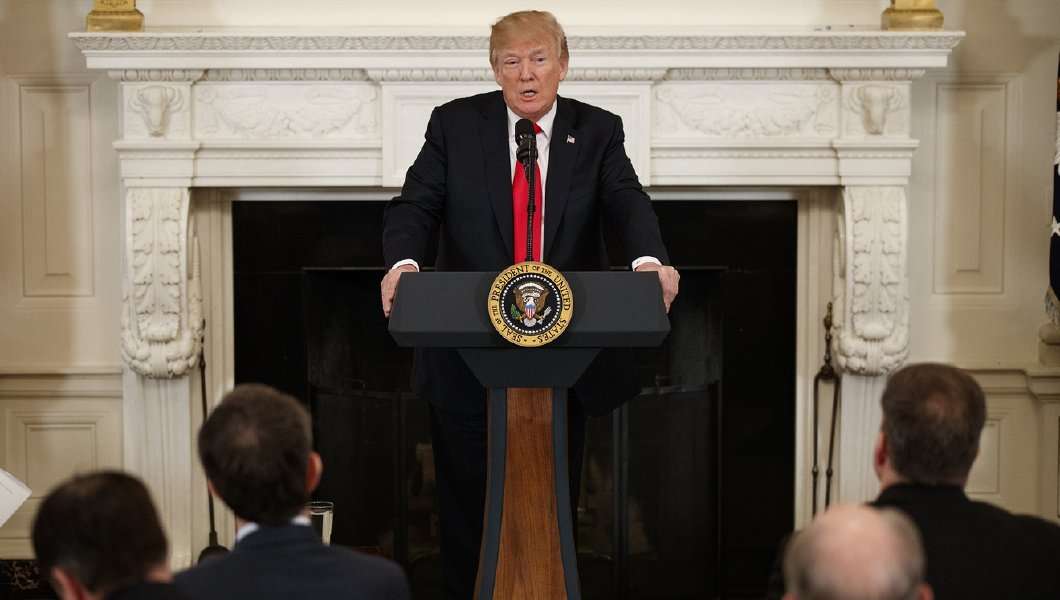President Trump said Monday that his decision to impose tariffs on solar panel imports is bringing back solar manufacturing to the nation, which the solar industry called out as misleading and untrue.
Trump made the comments to a group of governors he addressed at the White House on Monday. He said that 32 solar panel plants that had either been closed or placed on life support are now coming back due to the tariff protections.
"Of the 32, 30 were closed and two were on life-to-life resuscitation. They were dead," Trump said. "Now, they are talking about opening up many of them, reopening plants that had been closed for a long time." He also said five new factories were in the works.
But much of the U.S. solar industry had opposed the implementation of the tariffs. In the wake of Trump's comments on Monday, the industry's lead trade group said it is just as resolute as ever that tariffs are the wrong direction for the nation.
"Let there be no doubt that the tariff decision was bad for American jobs and our economy," said Abigail Ross Hopper, president and CEO of the Solar Energy Industries Association.
"While we have not heard of five new factories in the works, we can be clear about what we do know: that these tariffs will raise prices for US solar customers and cause thousands of Americans to lose their jobs," she continued.
A bipartisan letter sent to Trump late last week by Senate Finance Committee members Sens. Tim Scott, R-S.C., and Michael Bennet, D-Colo., asked the president to reconsider the tariffs. They argued that the tariffs would erode tens of thousands of solar jobs in the states.
Hopper added that the president's comments reflected the misinformation being spread by one of the companies that had petitioned the government for the tariff protections, the Chinese majority-owned company Suniva. The company, along with German-based firm SolarWorld, had petitioned for the solar tariffs after facing bankruptcy.
"As for the 30 companies referenced, that is a myth that Suniva has been using the press to spread," Hopper said.
Hopper's group issued a summary of the companies that had closed before the tariffs were implemented by Trump. The industry group found that the companies referenced by Trump were not all manufacturers of solar cells and panels, and "did not go out of business primarily because of imports," Hopper said. A majority of them had gone out of business because of technological difficulties and poor business management practices.
"We remain strong supporters of U.S. solar manufacturing, but believe this trade case was the wrong way to encourage it," the trade group president said.
Trump in January announced 30 percent tariffs on imported solar panels, which will progressively drop over the next three years.
Trump said Monday that the solar manufacturing industry in the U.S. makes a much higher quality product than what is coming from China.
"We make better solar panels than China," Trump said. "One of the knocks were that the solar panels were lousy" coming from Asia, he added.

mattreyu on February 26th, 2018 at 23:31 UTC »
Is there any more detail as to why they would directly harm US solar companies and American jobs? I didn't see any explanation in the article.
NoFunHere on February 26th, 2018 at 23:31 UTC »
This is actually a pretty misleading article, though I am willing to give the author the benefit of the doubt and assume that it is unintentionally misleading.
There isn't "a solar industry". There are really two solar industries in the US. There is solar engineering & manufacturing as one and installation & support as an almost separate industry.
The tariffs, in theory, help the engineering & manufacturing industry while also protecting the environment. This industry has fewer jobs but they are much higher paying jobs. The installation & support industry has many more jobs, but they are lower paying jobs. The "industry" talked about in the headline is actually SEIA, the trade group made up mostly by installation and support companies and workers.
The installation and support industry favors Chinese solar panels because they are cheaper and they can install more of them. They really aren't chartered to worry about engineering and manufacturing jobs or the environmental impacts of making solar cells in China.
The engineering and manufacturing industry likely loves the tariffs and the 32 companies mentioned belong to this industry.
So the article mentions one set of jobs, but then mentions a statement from a downstream industry that benefits if the upstream fails. Sloppy.
RyanUnited on February 26th, 2018 at 23:16 UTC »
The sad thing is that while solar energy can provide energy it can’t replace oil for its industrial lubricants and polymers.
We gotta get hemp oil rolling. Big time.